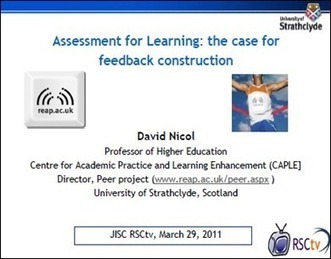Example how-to: feedback to students. Build your feedback skills in 4 minutes! Learn how to acknowledge the essentials and not overwhelm learners, allowin
Get Started for FREE
Sign up with Facebook Sign up with X
I don't have a Facebook or a X account
 Your new post is loading... Your new post is loading...
 Your new post is loading... Your new post is loading...
|

Jiaqi Yu's curator insight,
January 29, 2015 1:57 AM
In this article, NIcole provides valuable suggestions about how to develop a post-course evaluation. However, based on the four-level theory proposed by Donald Kirkpatrick (Reaction-Learning-Behavior-Results), I think Nicole mainly focuses on the first two requirements without much consideration in terms of "change in behavior" and "final results" after finishing this course/program.
Actually I believe “Reaction” and “Learning” can be relatively much easier to be accomplished by teaching necessary knowledge and skills and establishing a positive atmosphere of learning community. In this contexts of e-learning course, it refers to students’ satisfaction about course content or format, and specific knowledge/skills acquired. However, for “Behavior” and “Results”, they are much more significant and insightful, but also difficult to be measured, especially to those topics related to communication, diversity, empowerment, and leadership and so on. More follow-up surveys or interviews may be one option to measure students’ change in attitude, behavior and action.
Welcome more comments about how to measure those “impossibly measured” results! 
Nadia Jaramillo's comment,
January 29, 2015 10:27 PM
The big question is certainly how to measure the change of behavior.

Jessica Ashdown's comment,
January 30, 2015 3:15 PM
Yes, I agree that there can be trouble in how to measure the change in behavior. But this may bring up the idea that perhaps there should be some sort of pre-course evaluation and post-course evaluation to ascertain if there was any change in behavior over the course of the class taken. Sometimes we think of evaluation only coming after the fact, but there could be value in it coming not only after, but before as well.
|











